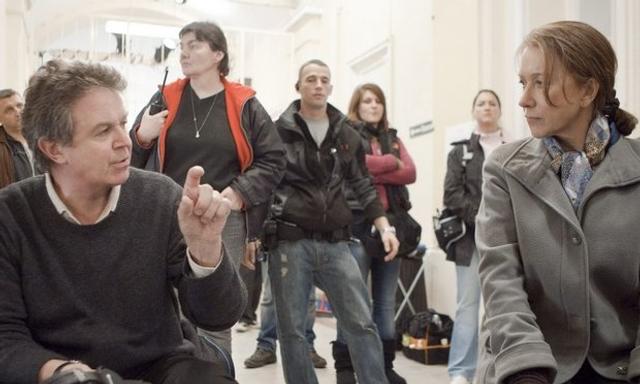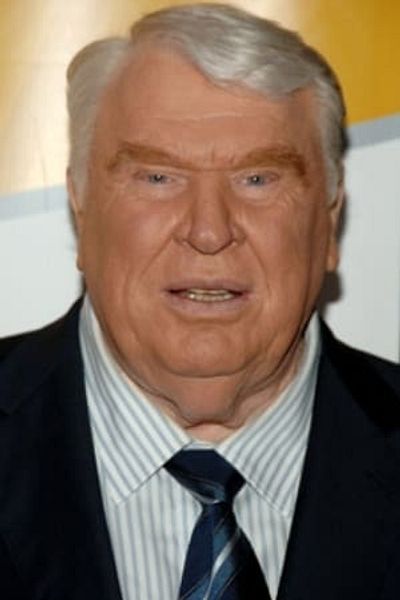In Conversation With... is our interview series where we talk to someone of the most well-known and respected actors and directors about their career, filmography, influences, what they make of the industry nowadays and everything in between.
John Madden's career can't be easily quantified or defined by any one particular genre - or medium, for that matter. His early career was spent in theatre and radio plays, famously directing the radio play versions of the original Star Wars trilogy from 1980 to 1996. Before long, he had moved into television and directed episodes of seminal BBC crime series such as Prime Suspect and Inspector Morse.
His best-known work is undoubtedly Shakespeare In Love, which won Best Picture and acting gongs for Gwenyth Paltrow and Judi Dench, as well as costume and screenplay awards as well. However, more recently, Madden has pulled more towards political thrillers, including 2008's Killshot and 2010's The Debt, reteaming with Prime Suspect star Helen Mirren.
We spoke to Madden about his work on the upcoming Miss Sloane, working with a dialogue-heavy script, approaching a tricky subject as an outsider and casting English actors in American roles.
With something like Miss Sloane, it's so laden with dialogue and the film is so driven by it rather than the directing and visuals, how do you keep control of it?
The key to any film, in my view, before you even begin to turn a camera over is to make the movie on the page. I'm very intricately involved with the writer, in this case especially, so as it was Johnny Perera's first film, and rhythm is key to everything. There's a process, you know, they just don't say their lines! (laughs) So the mise en scene, the way you set the scene up and the sense of movement are very critical.
Hopefully, they're not things you notice - they're just key to the way the film unfolds. One challenge, and you alluded to it, is how do you make a film that is intended to be a thriller - perhaps not in the sense that you'd normally characterise that in genre terms - that is primarily driven forward by words, as opposed to action. If you can pull that off and get people gripped, then that's something to be very happy about. I think the film does do that.
The constant reaction I've had from people is that they don't expect it to be like the way it is! (laughs) They think it's going to be a dry, political film. It's very intense, very human and relentlessly surprising and escalates in a way you don't see coming. It's all in how you unfold it, withhold it. Rhythm is always key, and audience engagement is sped up and slowed down, and that's very carefully built in. I rehearsed the script carefully, around a table, to build up the kind of texture of people who work together - and then give them the mise en scene, block the scene, and try let it run free and be free in the context.
Yeah, you think of political thrillers like All The President's Men and it's all very static. Did you have a visual idea in your mind for how Miss Sloane would look?
Oh yeah, I did. That was very carefully worked out with the production designer, the cinematographer and myself. How we used textures, glass, how we use interruption of an image, when to try and hold a sequence in a continuous flow. One of the experiences of the film is you trying to keep with up the characters, and you turn a corner, it's not what you expect! (laughs)
That's the strategy of it. I wanted the camera to be alive, not pointlessly alive, but alive to the characters and the nuance of what was going on with characters. It's a very strong part of the story is what's happening to the people around her (Jessica Chastain) and what's happening to her in ways she doesn't realise and understand. The film happens in many layers, in an ostensible layer and then a hidden layer of strategy that has to be revealed, and then a third layer of the media representation of the story and how that's being received, and finally, the hidden narrative of what's going on inside her. There's a lot more ingredients than, wow there's a lot of words! I'm not referring to you saying that, the first AD said the same!
Looking over your filmography, it's so varied and - with respect - I didn't think this would be your type of thing. I mean, the closest I could reasonably compare it to would be something like Prime Suspect?
I suppose so.
In one sense, it's a procedural and I've certainly done those before. I guess you like to challenge yourself with new territory. But I don't sit there planning my career, I just responded to the material and found it exciting and energising. I was very happy to be in its company when I was working on it. We worked on it carefully for quite a while, and you learn more about it when you give it to actors and how they react to it and play around with it.
I agree, it may not appear initially to be in my zone, but it definitely has some affinities with The Debt, or Prime Suspect. But, y'know, I quite like the fact I can't be defined by any genre! (laughs) The movies I now get sent for consideration include period dramas often with women at the centre, to whimsical comedies involving older people, to muscular thrillers, to very dark material - it's quite extraordinary! (laughs) But, to me, it's the writing is where it all starts. Even when I first got it, it was a different iteration to what it ended up as, but it was a compelling script and unless I screw it up, I ought to be able to make it compelling to watch! (laughs)
You mentioned there that it was a different iteration and, as I was watching the film, I got the sense that with the slightest nudge in a particular direction, this could have been some kind of a witty political comedy or something.
Well, the humour was intentional. It's not much fun watching a po-faced movie. I think humour, in a good script, always has a place. It was a wittily written script, and some of the jokes that I'm most fond of that go right past the audience! (laughs) There was one joke that I loved and I don't think Jessica get - and she's usually so smart with scripts - when she first read. Her character's just outraged her boss and her boss is storming towards his office and he says, "I want Sloane in my office now!" He turns the corner and there she is, and she says, "She's good, isn't she?" (laughs) It goes so fast that the audience doesn't necessarily spot it.
But, no, the way it chiefly evolved was what was happening to her. It would have always been compelling and its structure, its story - though, again, that changed as we began to authenticate things forensically - it was more or less in place when I first read it, but what was happening to her, was not. I suppose that was because... he hadn't written enough to understand how that was working. He was certainly capable of it once we started to do it, which is what I'd say the hidden narrative is with her, the emotional assault she has to deal with. All of that changed a great deal and everything gets richer with that sort of thing. Control of tone is a very crucial thing in a movie, how you get them to where you want them to be. If the movie's working right, you can't extrapolate any one thing and point to that.
With a cast like Mark Strong and Gugu-Mbatha Raw in this, they're both English, and you're an English director. You're working on a very American story in a very American way; was there any sort of remove from it that came into the making or your own opinions on the topic?
No, not really. I was just nationality-blind in the casting zone. It's extraordinary how those barriers have broken down now. You don't bat an eyelid if you see Cate Blanchett playing whatever nationality she plays, and she very rarely plays her own. Mark Strong plays all sorts of nationalities, so I didn't think of that - just the quality of the actor. The fact that Mark and Gugu are both British - although she spends most of her life in the US - didn't feel relevant.
The real danger with something like this is to... be sitting, pointing the finger at an embarrassing political dysfunction because everyone involved in the film - including a large contingent of Canadians, for whom it's a more pressing issue because they're neighbours - come down on one side of the argument on guns. But, the film is deliberately not a polemic. It's simply an unpacking, a kind of investigation of what the issues are that surround this most baffling of issues - when looked at from an outside perspective. It's hard not to be shocked by some of it, though.
Well, England and Ireland don't have gun cultures, I suppose.
You don't rush to judgement, but you are driven by a curiosity and a need to understand why something would be that way. We'd have fallen into a trap if we simply demonised the other side of the argument. The casting of the key guy in the gun lobby, for example, was a very crucial part of casting because he's strangely plausible and relatable, though some of the arguments coming out of his mouth really can't be right! (laughs) It's important the character - who'll you know whom I referring to who appears later in the film - is the best possible argument for responsible gun ownership. It's important to get those things right as well.
It was said to me more than once that an American couldn't have made this film - not because they didn't have the skillset, but because it would be hard for it not to become polemicised, I think, in American hands.
Miss Sloane is in Irish cinemas now.













































































